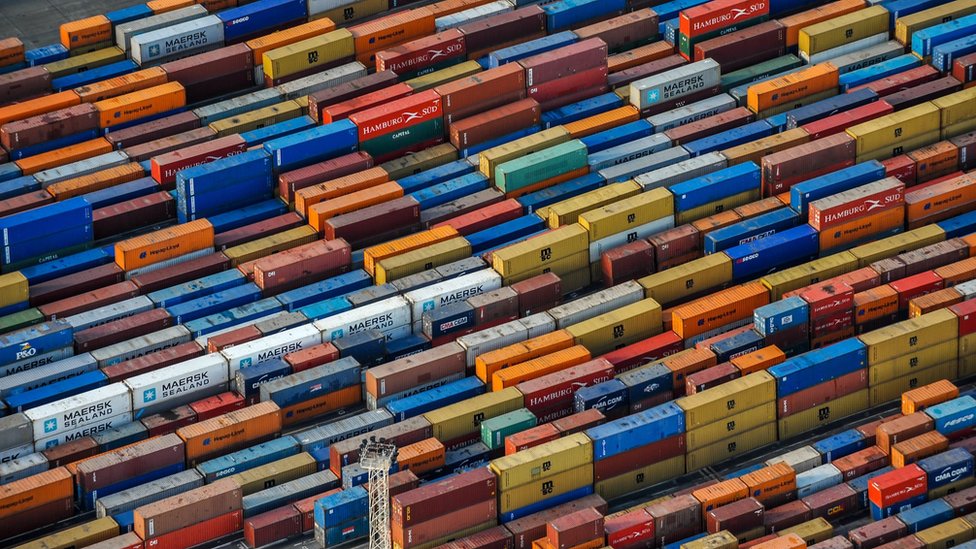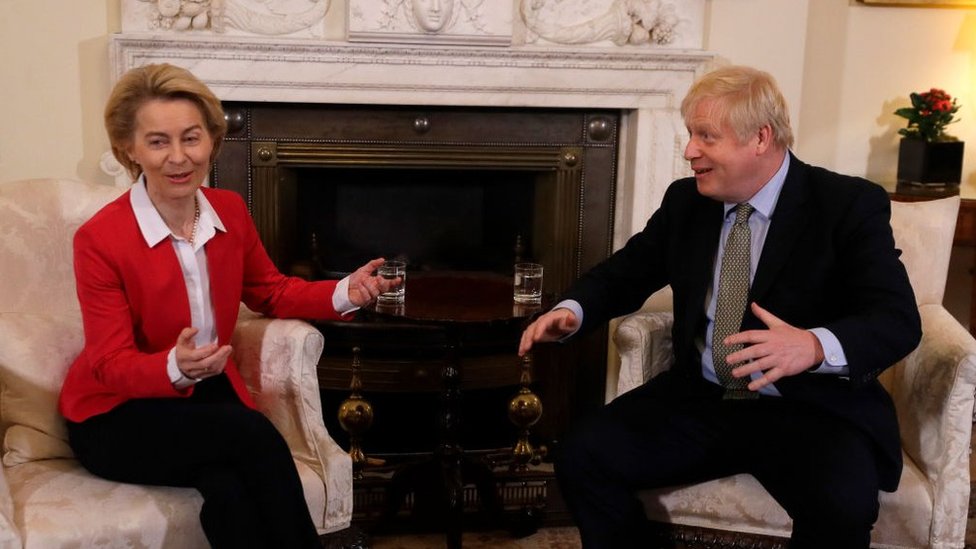A question that has dominated the post-Brexit trade talks right from the start remains unresolved.
By Chris Morris
Reality Check correspondent, BBC News
(The video in the above box is shown at the end of this article below)
A question that has dominated the post-Brexit trade talks right from the start remains unresolved.
How closely aligned with the EU's economic structures will the UK be in future?
As the negotiations head into their final phase, before the UK leaves the single market and the customs union at the end of the year, the answer still depends to a large extent on what's known as the level playing field.
But while the EU emphasises fair competition, the UK insists on sovereignty. It is a disagreement that gets to the heart of what Brexit is all about.
What does it mean?
The level playing field is a trade-policy term for a set of common rules and standards that prevent businesses in one country gaining a competitive advantage over those operating in other countries.
It's about fair and open competition and it's an important part of the EU single market in which member countries allow the free movement of people, goods, services and capital.
The trade negotiators have been trying to reach agreement for months on how widespread level playing field provisions should be once the UK is no longer part of the single market.
The EU is insisting they must be maintained when it comes to regulations involving workers' rights, environmental protection, taxation and - in particular - state aid (or government subsidies for business).
It refuses to guarantee the UK the best access to the single market - with no tariffs or taxes on goods crossing borders - if there is a possibility that companies based in the UK could be given state support to undercut their rivals elsewhere in Europe.
Is the EU trying to make the UK a special case?
Yes and no.
On one hand, almost all trade agreements involve level playing field provisions, because all parties are keen to ensure their businesses aren't operating at a commercial disadvantage.
But the closer a trading relationship is, the stricter those rules become.
And the EU points out that the UK is one of the world's largest economies, right next door, and already deeply integrated with European markets.
What this means in practice is if the UK wants a trade deal that involves no tariffs and no quotas (no limits on the amount of goods that can be traded), the EU will expect it to sign up to stricter rules than those set out in other recent EU trade agreements with countries such as Canada or Japan.
In other words, it is a special case because there is far more trade involved and the stakes are higher.
What are the options?
Prime Minister Boris Johnson wants a zero-tariff, zero-quota deal, but also insists on the UK's right to diverge, or move away from, EU rules and regulations.
That freedom to choose was partly what Brexit was all about. It could mean sticking closely to EU rules in some areas but not in others.
But the EU insists freedom comes at a price, which means the strictest level playing field rules it can negotiate.
One option is to have what are known as non-regression clauses, which means the two sides would agree not to water down the shared rules they currently have.
In areas such as labour laws and environmental regulations that affect the way businesses operate, they are trying to agree a baseline of standards that they will both meet.
But the argument over state aid, or subsidies, is even more complicated.
Subsidies are a problem
The EU has relaxed its initial demand that the UK should copy and paste its rules on state aid now and in the future, something known as dynamic alignment, but it has still been pushing for something fairly close to it.
It basically wanted the UK to agree a legal framework for competition rules that largely mirrors its own, with a strong independent regulator sorting out disagreements.
But the UK has been insisting it has the right to set up its own subsidy system, and any deal must fully respect its sovereignty.
"That is not just a word - it has practical consequences," says the UK's chief negotiator David Frost, including "deciding ourselves on a robust and principled subsidy control system".
The government has said its new state aid system will be based broadly on international rules, but it has yet to set out its plans in real detail.
And the EU says that isn't good enough.
"We are ready to be creative," says President of the European Commission Ursula von der Leyen, "but we are not ready to put into question the integrity of our single market".
If there is to be progress then, one side or the other (and probably both) is going to have to compromise on some pretty fundamental principles.
Resolving disputes
With so little time left, there is also a big focus on how any future disputes should be resolved.
That's really important because if the UK is going to have a different subsidy system, some EU countries want to make sure there are serious consequences for breaking the rules.
They are insisting on "cross-cutting" measures, allowing either side to retaliate against subsidies that break agreements in one policy area, by hitting back in another.
So, the precise nature of this enforcement mechanism is a vital part of any potential deal.
It's another reminder that while the UK wants to remain a friend and partner of the EU after Brexit, it will also become an economic rival.

